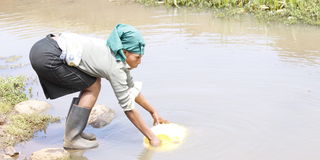Timau residents draw from dirty river amid shortage of piped water

A woman fetches water from River Timau in Timau town on January 28, 2022. The town has been hit by water shortage for the last two months.
For the past two months, Ms Carol Kendi, of Timau in Meru County, has been making five round trips every evening to the heavily polluted River Timau to fetch water for domestic use.
This is the same predicament facing more than 10,000 residents of Timau, who must now dig deeper into their pockets to buy clean drinking water.
The town, in Buuri West sub-county, was hit by a water shortage two months ago, leaving locals to rely on the only other available source – River Timau. The shortage was blamed on illegal abstraction upstream.
“I relocated to Timau recently, but I almost went back to my village because of the acute water shortage. I am now getting used to carrying a jerrican of 20 litres on my back. The river is badly polluted but we don’t have an alternative,” Ms Kendi said.
Every day, hundreds of residents scramble along the banks of the river adjacent to the town to get the precious commodity.
Drinking dirty water
Residents of the neighbouring Riverside slums and Mukuri and Mbitika villages have resorted to drinking the dirty water.
Several donkey carts loaded with up to 20 containers and bicycles carrying up to five line up along the river banks as water vendors rush to deliver the commodity to their customers.
Ms Josephine Nanjala, who sells water using a bicycle, says she has been supplying up to 70, 20-litre jerricans every day since the acute water shortage hit Timau.
“I quit my job on the flower farm because it was tedious and denied me time with my children. When I left, I discovered that I could distribute water to homes because many women cannot go to the river. I’m woken up as early as 4am by people who want water for the day,” Ms Nanjala says.
Using her bicycle, she carries five jerricans from the river and sells each for Sh20.
“I make not less than Sh600 per day from selling the water compared to the Sh300 I was getting at the flower farm. It is good business.”

Water vendors fetch water from River Timau in Timau town on January 28, 2022. Every day, hundreds of residents scramble along the banks of the river adjacent to the town to get the precious commodity.
Health hazard
Residents have warned that continuing to use water from the river is a health hazard, with reports of increased cases of stomach ailments.
“We are in danger because we cannot afford to buy clean water for too long. Those who cannot afford Sh1 per litre are already drinking from the river,” Mr Moses Gaciatta said.
The severe water shortage in Timau is due to declining water levels at a spring in the Mt Kenya forest, which is tapped by 13 other users, said Imetha Water Services Company Commercial Manager Winfred Mukiri.
The water source in Mt Kenya forest is on the decline amid low rainfall and rising demand for irrigation water, she said.
“We have not had sufficient rains in the last three years in the area, affecting the spring volumes,” he said.
“The decline in the volume has contributed to illegal abstraction and vandalism on our pipeline by farmers. They also make illegal connections on our line for irrigation.”
Pipeline vandalism
The shortage in Timau, she said, was caused by vandalism to the company’s pipeline in the forest.
She added that the competition for drinking and irrigation water increased after the Kenya Forest Service allocated residents land in the forest for farming as they take care of trees.
The Meru Water and Sanitation Services Company (Mewasco) said recently that it was looking for Sh80 million to upgrade the Timau town water pipeline to prevent illegal abstraction.
“Our plan is to lay a high-density pipeline that is not susceptible to punctures and bury it six feet under the ground along the road corridor,” said CEO Joseph Mberia.
“The current one passes through farms, which exposes it to the risk of people tampering with it.”





